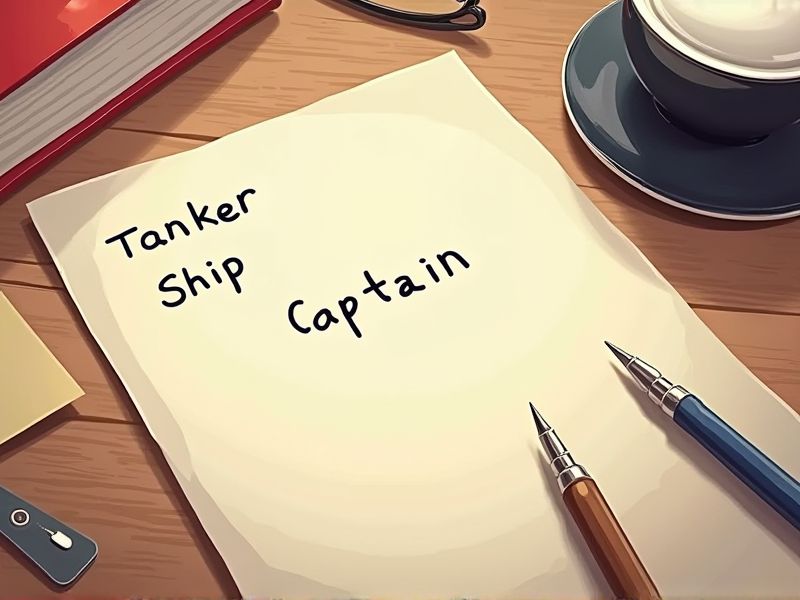
Tanker ship captains manage complex vessels that transport hazardous materials, making their role both challenging and critical to ensure safety and efficiency. To navigate international waters and comply with strict maritime regulations, captains must demonstrate a high level of competence through specific certifications. These certifications validate their knowledge in areas such as cargo handling, safety protocols, and emergency procedures. Key certifications necessary for a tanker ship captain include those related to maritime safety, navigation, and specific cargo endorsements.
STCW Basic Safety Training Certificate
The STCW Basic Safety Training Certificate ensures that a Tanker Ship Captain has the necessary skills to handle emergencies and maintain shipboard safety. This certification includes training in firefighting, personal survival techniques, first aid, and personal safety and social responsibilities, all critical for managing a vessel carrying hazardous cargo. Adherence to international safety standards is mandatory, minimizing the risk of accidents and environmental harm. Without this certification, a Tanker Ship Captain cannot legally fulfill their role as per the International Maritime Organization (IMO) regulations.
Certificate of Competency (Master Mariner with Tanker Endorsement)
A Certificate of Competency (Master Mariner with Tanker Endorsement) is required for a Tanker Ship Captain to legally command and navigate tankers as per international maritime regulations. This certification ensures that the captain possesses the necessary knowledge and skills to safely manage the unique challenges posed by tanker operations, such as the transport of hazardous liquids. Compliance with this requirement reduces the risk of maritime accidents and environmental pollution by ensuring effective implementation of industry safety standards. Certification also facilitates global trade by satisfying the legal prerequisites established by maritime authorities for seafaring professionals.
Advanced Tanker Familiarization Course Certificate
An Advanced Tanker Familiarization Course Certificate equips a Tanker Ship Captain with the specialized knowledge needed to handle the unique challenges of operating a tanker safely. Knowledge gained from the course minimizes risks related to hazardous cargo, directly impacting safety procedures. Regulatory bodies mandate certification to ensure captains meet international safety standards. Possessing the certificate enhances the captain's competency in emergency situations, contributing to overall maritime safety.
GMDSS Radio Operator Certificate
The GMDSS Radio Operator Certificate ensures the Tanker Ship Captain can effectively use the Global Maritime Distress and Safety System for emergency communication. International maritime regulations require this certification to enhance safety and compliance at sea. Possessing this certificate equips the captain to handle distress calls, thereby minimizing the risk and impact of maritime accidents. It signifies that the captain has proficiency in utilizing advanced communication technologies vital for navigation and crew safety.
ISPS Code Certification
The ISPS Code Certification for a Tanker Ship Captain ensures compliance with international security regulations, aimed at preventing maritime terrorism. This certification enhances the captain's understanding of security protocols, crucial for protecting valuable cargo and crew. Without it, a tanker may face restricted access to ports that require verified security measures. The code also fosters a culture of proactive risk management and vigilance among the maritime community.
Bridge Resource Management (BRM) Certificate
Bridge Resource Management (BRM) training plays a critical role in enhancing decision-making skills for tanker ship captains. The high-risk nature of operating tanker vessels necessitates structured communication and optimal workload distribution, both central tenets of BRM. Regulatory bodies, such as the International Maritime Organization, mandate BRM certification to ensure adherence to safety protocols and efficient crisis management. The certificate ultimately leads to improved vessel performance and reduced human error incidents.
Ship Security Officer (SSO) Certification
Ship Security Officer (SSO) certification is necessary due to international regulations outlined in the International Ship and Port Facility Security (ISPS) Code, which mandates a structured approach to maritime security. Without this certification, tanker captains may lack crucial skills in identifying threats and implementing appropriate security measures, potentially compromising vessel safety. Completing SSO training ensures captains are prepared to handle security incidents and coordinate with relevant authorities, reducing the risk of piracy or terrorism. Tanker ships, given their cargo, pose significant risks if left unprotected, necessitating certified personnel to uphold stringent security protocols.
Advanced Firefighting Training Certificate
The Advanced Firefighting Training Certificate equips a Tanker Ship Captain with critical skills to handle fire emergencies onboard effectively, minimizing risks to crew and cargo. Regulatory bodies like the International Maritime Organization mandate such certification to ensure compliance with global safety standards. Without this training, the potential for catastrophic financial and environmental repercussions from tanker fires increases significantly. The certificate also fosters confidence and preparedness among the crew, thereby enhancing overall safety and efficiency during fire-related incidents.
Proficiency in Survival Craft and Rescue Boats Certificate
A Tanker Ship Captain must possess proficiency in survival craft and rescue boats to ensure effective emergency response, crucial for the safety of the crew in hazardous situations. This certification equips the captain with the skills needed to operate and manage survival equipment, which is vital during evacuation procedures. Regulatory compliance demands that captains on tanker ships meet international safety standards, and this certification serves as evidence of meeting those standards. The presence of qualified leadership can influence the overall safety culture on board, reducing potential risks associated with maritime operations.
Medical First Aid and CPR Certification
Possessing Medical First Aid and CPR Certification equips a tanker ship captain with essential skills to handle medical emergencies when at sea, where immediate professional medical help is unavailable. This certification ensures the captain can provide initial care, potentially stabilizing a crew member's condition until advanced medical assistance is accessible. Having proficient first aid knowledge minimizes risks and enhances safety onboard, directly impacting the well-being of the crew. Regulatory bodies often mandate such certification as a prerequisite, aligning with international safety standards to reduce maritime accidents and fatalities.
Summary
With new certifications, you as a reader can expect the Tanker Ship Captain to enhance operational safety. This improvement stems from the captain gaining updated knowledge and skills. The ship's efficiency may increase, reducing risks of accidents or non-compliance. The certifications also elevate the captain's professional credibility, fostering trust among crew and stakeholders.
